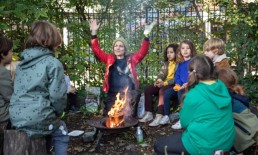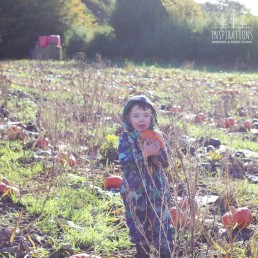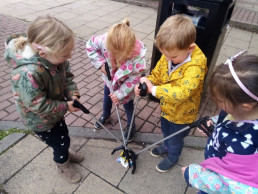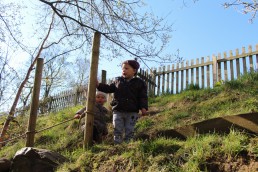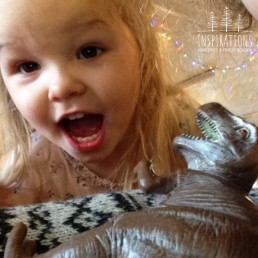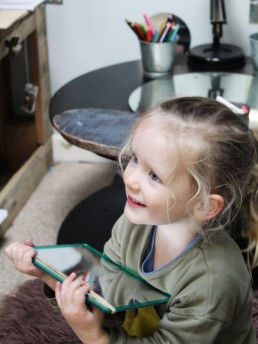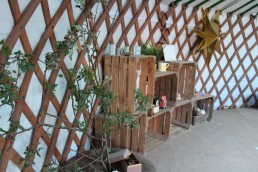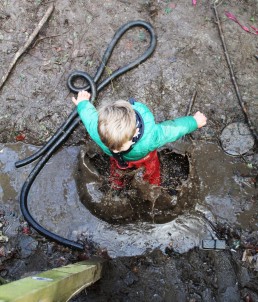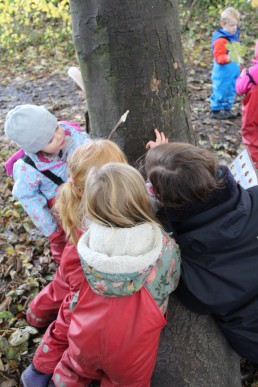Teaching Maths through Nature
In my last blog ‘Lets Shake Up Education’ (25th March 2022) I highlighted my personal issues with today’s education system and explored the idea of schools being encouraged into an alternative method of teaching, potentially along the lines of Inspirations’ philosophy and pedagogy of child centred learning and adult/child collaboration and team work.
 In our current mainstream schooling system we have reduced teaching maths (along with a myriad of other subjects) to a behind the desk repetitive, memorising task with little to no practical, exciting exploration of content. It is hardly surprising then to note that a recent US study from The National Centre for Educational Statistics, suggested that approximately 70% of year 4 girls report an interest in maths, but by year 8, this figure had fallen to 53%, the largest decline during any period of time in a girl’s K-12 experience. For boys, 69% report an interest in maths in year 4, declining to 58% by year 8.
In our current mainstream schooling system we have reduced teaching maths (along with a myriad of other subjects) to a behind the desk repetitive, memorising task with little to no practical, exciting exploration of content. It is hardly surprising then to note that a recent US study from The National Centre for Educational Statistics, suggested that approximately 70% of year 4 girls report an interest in maths, but by year 8, this figure had fallen to 53%, the largest decline during any period of time in a girl’s K-12 experience. For boys, 69% report an interest in maths in year 4, declining to 58% by year 8.
Part of our philosophy here at Inspirations, is learning through nature, and when you really look closely, you can see so clearly maths throughout natural structures, it is in fact at the heart of all things natural! As The Centre for Learning Through Nature so aptly describes it-
‘It is ironic that teaching maths this way (though nature) should be considered innovative: Nature has long been the inspiration for the development of mathematical ideas. Mathematicians throughout history have marvelled at the fact that maths seems to “fit Nature like a glove.” “How can it be that mathematics,” Einstein famously wondered, “being after all a product of human thought independent of experience, is so admirably adapted to the objects of reality?” Galileo simply put it this way: “Mathematics is the language with which God has written the universe.”
 Indeed, mathematicians have discovered mathematical rules in the nature of light and gravity, in the shape and movement of planets, in rivers and trees, and in the beating of people’s hearts. It might fairly strike some as strange, then, that maths education so rarely has any Nature in it.’
Indeed, mathematicians have discovered mathematical rules in the nature of light and gravity, in the shape and movement of planets, in rivers and trees, and in the beating of people’s hearts. It might fairly strike some as strange, then, that maths education so rarely has any Nature in it.’
I ponder why this is so, it saddens me that it is. I know for certain I would have been so much more involved in a maths curriculum if it had, and my children too.
If you are interested in supporting your child’s mathematical development through practical, outdoor lead, nature enriched activities then think about going on an expedition to find:
1) The Fibonacci Sequence: a sequence of numbers beginning with 1 and 1, with each subsequent number being found by adding the two previous numbers together. Therefore, after 1 and 1, the next number is 2 (1+1). The next number is 3 (1+2) and then 5 (2+3) and so on.


2) Fractals: meaning the same basic shape is seen again and again in the shape itself, if you were to zoom way in or zoom way out, the same shape is seen throughout. Take a look at a fern leaf for example.
3)Shapes: hexagons in honeycombs or try blowing bubbles and see what shape you make.
4)Concentric circles: look at the circles in a tree stump or draw some in the mud.
Our whole galaxy is a mixture of these incredible mathematical principles, why then is our maths curriculum not giving our children the opportunities they deserve. Opportunities to explore these truly exciting principles?
I for one don’t understand, and the system in my view must change. A change in the right direction could give our children back autonomy over their own learning, to find the excitement of learning and exploring within and of nature. Who knows, maybe, like Galileo and Einstein, they too might discover some new principle of the universal language of maths, an opportunity not likely to happen sat behind a desk following a prescribed performance related curriculum…
What do you think?
-Nicola


Forest School in the News
It's becoming more common to find Forest School articles making the news and for all the right reasons. Out of the turmoil of lock down came some good news stories, and here is one that we wanted to share with you.
Lockdowns were “a chance to get off the treadmill” for families, says Lewis Ames, co-director of Devon-based forest school Children of the Forest. They’ve seen a rise in applications since the start of the pandemic, with about 150 families on their toddler-group waiting list, and 50-60 children on the waiting list for their forest school for home-educated children.
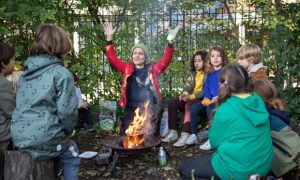
Pumpkin Picking
It's that's time of year again...
The time that nature hands us natural learning supplies by the plenty. Conkers, acorns and fallen leaves are brought into our learning environment to inspire creativity, discussions, and all kinds of learning through play.
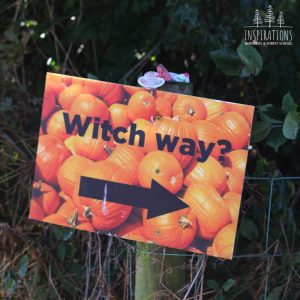
In the Art Studio, the children are inspired by Leaf Man, making their own leaf people and arrangements on the Lightbox. But there is one thing missing: pumpkins!
Every year we take our pre-school children to Kemps Farm- Horsforth Pick your own. In spring they open up for strawberry and fruit picking. In Autumn they provide thousands of pumpkins all shapes sizes and colours. How lucky we are that this is on our door step.
So on this crisp cold but sunny Thursday morning in October we counted heads, suited up and set out for our Autumn adventure.
A Beautiful Day
When we arrived it was a little different to last year, much to their delight, this time we had a tractor ride to the field. Just 5 minutes from nursery and we somehow felt like we were in the middle of the countryside. Next year the tractor driver said he might even drive us right back to nursery.
As we meandered around the one way dirt tracks through the fields of orange the children selected the pumpkins to bring back. Orange, white, green, bumpy, they selected a total variety. The terrain added to the adventure, climbing over the winding stalks and wading through the mud was a naturally formed assault course. We definitely recommend wellies!
Wheel barrows full and imaginations captured we began our walk back to Inspirations. We arrived back to our yurt in time for our Spaghetti Bolognese and we look forward to showing you what we do with our chosen pumpkins next week. Watch this space.
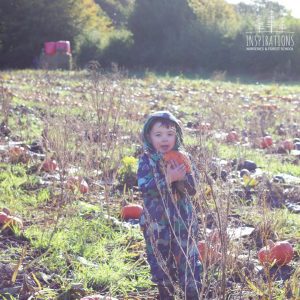
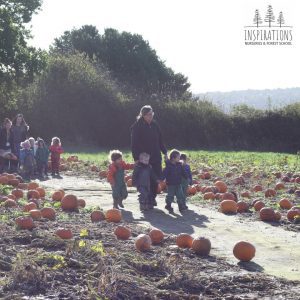
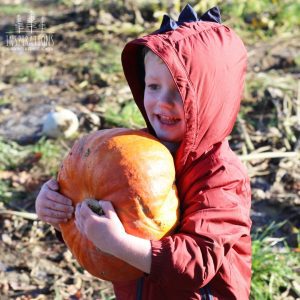
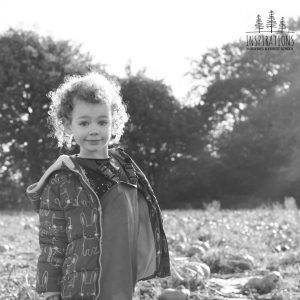
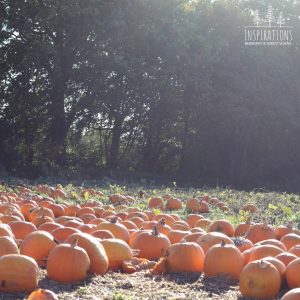
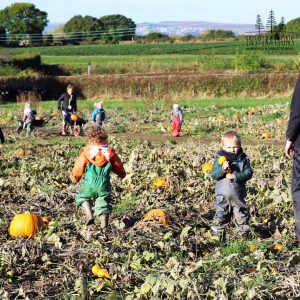
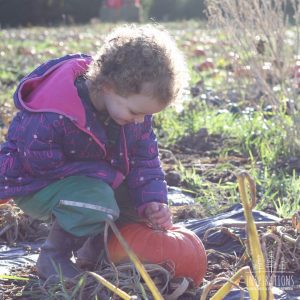
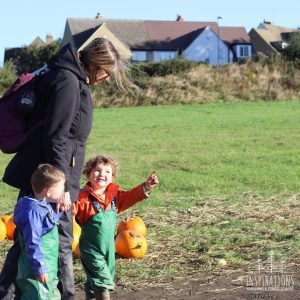
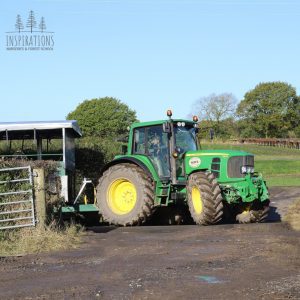
Happy Halloween!
-Nathalie
Little Litter Pickers
It was during one of our daily Forest School trips that one of our Pre-School children expressed disappointment at finding litter on the ground. We decided to order some litter pickers and set out on an adventure to clean up Horsforth.
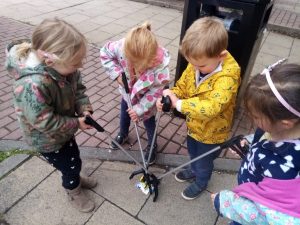
At least once a week now a small group set off around Horsforth with Litter Pickers and a bag, collecting every item of trash they see along the way. So far we have met some wonderful people who stop and thank the children. It's a wonderful way of getting exercise, meeting our locals and helping our community.
Watch the video here-
https://www.youtube.com/watch?v=5N-yULXVwjk
We're proud of our children for noticing the world around them and caring about the place they live. Would you like to help make Horsforth a cleaner place? Check out the Horsforth Litter Pickers group on facebook.
Toddler's Forest School Garden
Measured Risks and The Great Outdoors
Getting outdoors could not be more important right now, and the health benefits that come with it are not only beneficial but fundamental to our wellbeing. But are the youngest members of our society getting enough outdoor adventurous play? Recent studies suggest not. 85% of parents admit they would like their children to have more adventure, whilst 44% admit they played outside more as a child then their own children do. Indeed this is a sign of the times and sometimes children miss out on these opportunities due to safety worries.

At Inspirations you can rest assured that your children are getting more than their fair share of outdoor play. Our outdoor areas are of equal, if not more importance to our indoor spaces. The 2-3 age group is where our children are first introduced to a designated forest school area in addition to their outdoor area.
Our toddler room garden is an extension of their classroom, filled with repurposed objects and areas that support the many types of schemas as mentioned in the previous blog. There are balancing beams, planks, crates, small world areas to support interests, and many more. It is here we make use of the larger loose parts and ambiguous resources such as milk crates, planks and go kart wheels. We have an open doors policy so in all weathers our toddlers have access to the outdoors.
Raising Confident Learners
Not all children have easy access to nature, so it's important we offer this space from a young age. But why is it important for young children to experience adventurous play?
In 2019 we gained planning permission to extend our toddler room garden and build a Forest School Area. This zone is opened up with increased staffing and introduces the children to more adventurous play, with tracks, steps, netting, hills and trees to explore and climb.
Providing this access opens up valuable experiences they may not get elsewhere. As their brains are forming, growing and changing every minute these measured risks they are exposed to supports healthy boundaries and emotional and physical development. This purpose built area means children are using core muscles, with hills to mount and areas to climb. The uneven ground tests and strengthens their vestibular balance skills and coordination.
Whilst children navigate this recently developed area we encourage them to safely create their own boundaries, trial ways of movement, and learn to just keep trying. Instead of suggesting how to use the area, we as educators will avoid giving direction but instead ask open ended questions. 'I wonder where you'll go next?' or 'wow that looked really hard, and you didn't give up'. By focusing on questions and observations rather than just praise and direction we are building our toddlers inner confidence that sets them up for life.
By creating dens between the trees, growing lavender and scaling balance beams, having this little taste of adventure prepares our toddlers for Forest School when they move to Pre-school ....and beyond.






Being Two
This Month we are focusing on our middle room at nursery, the toddler room, also known as our Honeybees room. Being two is more commonly referred to as the ‘Dreaded Twos’ or ‘Terrible Twos’; a term we find very unjust and instead celebrate this age with the phrase ‘Terrific Twos'.
Terrific Twos
It is very easy to conclude that your Toddler is in the midst of the ‘Terrible two’s’ when they act up and try push your buttons, especially when you are faced with patience testing tantrums.
It is important to remember that they are experiencing so many emotions and ultimately navigating their way into becoming tiny humans. They do not mean to drive you to the bottle of wine sat in your fridge, they are just growing and learning whilst showing you who they are and that being two really is terrific.
Adventure and Independence
In our eyes being a two year-old is about adventure and independence, traits we
feel are continuing to shape them after the transition from Baby to Toddler.

The Toddler room, or the Honeybee’s room as we refer to it is set up to allow the above,
and is a large area both indoors and out to move around freely, with many areas of
provision to explore and investigate. Whilst these areas are being slowly destroyed by tiny
hands and feet, friendships are being formed, and language is continuing to develop by
using simple sentences to share feelings, experiences and thoughts. They become more
aware of others feelings, and they are starting to understand boundaries and routines, as
well as listening with interest and understanding simple questions.
Milestones - Potty Training
Being Two also comes with it's challenges and a certain milestone is often met during this
period of their lives… Potty Training! Early signs that they may be transitioning
to this stage include awareness and communication. From telling you that they have done
something in their nappy to expressing the urge to go, these are all clear indictors that the
time is right and you should go with it and know that we are always their to support you. Remember that children develop at their own pace and they may not be ready to be potty trained until later.

Here are some links to books and tips for support-
https://www.amazon.co.uk/s?k=potty+training+books+for+toddlers&crid=BLJ3UFJL3K9O&sprefix=potty+training+%2Caps%2C192&ref=nb_sb_ss_ts-doa-p_3_15


Children are not things to be moulded, but people to be unfolded- Jess Lair
Next week we will focus on the importance of schemas, with some tips to supporting young children's language development. In the meantime if you've had a tough day, you've passed bath time and skipped straight to bedtime, you're still doing a great job. Remember it is this age that children are making new connections in their brain, pushing boundaries and learning vocabulary at rapid speed. We have to give credit to them for all this multitasking, whilst keeping our silliness alive, reigniting our imagination, and providing daily entertainment.
Although there can be some hard times amongst the great times if we start to see the world through their perspective we might all agree that life as a toddler can be challenging but also very fun.
-Ashleigh
Pre-School at Adel
Are you longing to peer into the future, catch a glimpse of normality resuming once again? I think we can agree this is going on longer than we initially imagined, but here we are. We are still in this together, and we hope during these times of increased social distancing you can still maintain social connections online, just like those in this news story that brought a smile to our faces. https://www.bbc.co.uk/news/av/uk-55732174
So we start this blog by asking, how are you, and what are you grateful for? We are grateful to have our Inspirations Nurseries families that continue to bring a sense of community.
Last week our blog focused on our Horsforth Pre-School, so this week we hand over to Deborah our manager at Adel to talk about our other Inspirations Nursery only 10 minutes away.
Welcome to Adel
At Adel we take children from the age of three, to starting school. Like Horsforth, we follow the Reggio Emilia Approach, which comprises of loose parts, mirrors and reflection, natural resources and investigation of up-cycled and recycled trinkets and materials.



Our setting is within the grounds of Adel St John the Baptist Primary School which is surrounded by beautiful woods and trees. There’s a well-equipped natural garden with a climbing wall, workbench, piano, mud kitchen and bikes. We have the use of the super large playing field and the conservation area which we use twice weekly for Forest School.
Our planning involves the outdoors as much as indoors and the children can choose where they would like to play.
Inside we have a very spacious room with areas to promote learning wherever the children choose to be.
Set Out to Inspire
The aim of our pre-school environments is to inspire the children to want to explore and learn. We have a maths, literacy, construction, small world, home and creative area of which all have natural resources for the children to explore and a wide range of loose parts to promote maths, communication, imagination and problem solving.



After observing the children’s common interests, we plan as a team to add resources and challenges to the areas and talk to the children about what they know and what they want to know, and how they would like to learn.
The children’s key worker also plans for their key children’s individual interests to support and provide opportunities to progress in all areas of development. As we are a pre-school we encourage independence and all skills necessary for school readiness, such as being able to express their own needs, listen to others and stories, separate from their carer, independent self-care, and understanding of British Values which encourages respect for ourselves and others.
Phonic, Spanish and Creativity
We teach phonics which is differentiated to meet and challenge each child’s individual ability. At Adel we also introduce Spanish to the children; an introduction to languages through songs, games and activities promoting enthusiasm with learning languages later in school. We also have our own Atelierista who comes in 3 times a week to deepen creative projects in smaller groups.

Throughout both our Pre-School settings we support your children in becoming strong independent learners, enabling them to think critically and outside the box. Their use of imagination and their understanding of the world, alongside their ability to problem solve, will stand them out from the crowd and give them a head start in life.
If you love our nursery as much as we do, have any questions or are interested in joining us check out more on the website here-http://simonr30.sg-host.com/our-settings/adel/ or contact- deborah@inspirationsnurseries.co.uk
Pre-School at Horsforth
Happy New Year to everyone, it sure has been an eventful start to the year as we continue to tackle a pandemic with 3 inches of snow thrown in to test us. But hope and positivity prevails, and we really valued your responses to our previous blog on the little steps we can all take to create a more sustainable year.
We thought we would start the year of blogs by taking a look at our Pre-School Settings across Horsforth and Adel. Currently our Pre-School bubble at Horsforth has closed, so for those affected we are posting daily activities and zooms for the children, you can find all the information you need on Tapestry.
We start by looking back at 2018- the time we implemented the Reggio Approach into our classrooms, changed our name from Dolphins to Inspirations, and rebuilt our entire Pre-School area. This change meant moving the Toddler Room into the old Pre-School room, opening up a second Baby Room, and building a Yurt, Outdoor Class Room and Art Studio on the patch of un-used grass land behind our nursery.
Our Yurt



Flattening the land for our Mongolian Yurt was quite the task, over the spring months of 2018 the changes were finalised and after calling in help from some of our parents, together with Colin the Yurt was erected in just a couple of days. The Yurt is a unique space and feature at Inspirations that provides just one of many learning areas for our Pre-School children. It is a cosy space to warm up in adverse weather and to eat their meals during winter. The yurt is filled with literacy areas, maths areas, open ended resources and books for reading and researching. See more about our Yurt here- http://simonr30.sg-host.com/our-yurt/
Outdoor Classroom



Our children are predominantly outdoor learners, and our outdoor classroom is a constantly changing space that matches the children's interests and mirrors seasonal changes. Adapting our classroom to match their interests invites our curious young minds to explore and discover, and is the perfect space for them to unleash their creativity.
No Fear of Failure
Throughout our Pre-School areas room Reggio Emilia is of course the guiding principle, and our spaces reflect that. Our Project based approach provides the backbone of their learning, so it is important that our environment and educators support their creative thought process without any fear of failure.
Exciting News
 This January are excited to announce a brand new Room Leader for our Pre-School room. Jennie is an experienced Reggio inspired Early Years Educator who over the course of the last 15 years has worked in Dubai, Japan, Angola and Vietnam and has been to Reggio Emilia three times. We’re very excited that she has joined our team and brings her passion for our pedagogy and supporting children through child- led learning. Her email address is jennie@inspirationsnurseries.co.uk if you would like to get in touch.
This January are excited to announce a brand new Room Leader for our Pre-School room. Jennie is an experienced Reggio inspired Early Years Educator who over the course of the last 15 years has worked in Dubai, Japan, Angola and Vietnam and has been to Reggio Emilia three times. We’re very excited that she has joined our team and brings her passion for our pedagogy and supporting children through child- led learning. Her email address is jennie@inspirationsnurseries.co.uk if you would like to get in touch.
If you’re interested in your child joining our Pre-School over 3’s room please take a look at our website and get in touch with Kayleigh@inspirationsnurseries.co.uk.
 In next weeks blog we will be taking a look at our Pre-School setting over at Adel. In the mean time stay safe in the snow and please do send in any photos you have out exploring the weather. We will select some highlights to share on our social media this weekend.
In next weeks blog we will be taking a look at our Pre-School setting over at Adel. In the mean time stay safe in the snow and please do send in any photos you have out exploring the weather. We will select some highlights to share on our social media this weekend.
"We value space to create a handsome environment and its potential to inspire social, affective and cognitive learning. The space is an aquarium that mirrors the ideas and values of the people who live in it" -Loris Malaguzzi
- Nathalie
Every Cloud...
https://www.youtube.com/watch?v=6AAcMqAZlXU
I followed the children into the local woods to see what they got up to on their journey into the forest, you can watch the video on YouTube by following the link above. Unfortunately due to Covid regulations this was the last walk into the woods for a month or so, but every cloud has a silver lining. The children now have their forest school sessions on-site and it has inspired us to make the most out of what we have here.
Forest School On Site

We have added some rope swings over the stream, and a slide down to the forest school area. This week during the forest school sessions our 3 and 4 year olds have been learning how to use a pneumonic drill, they’ve made oat pancakes on the outdoor campfire and are learning how to put on their outdoor suits independently. Staying on-site during forest school has also opened up some team building opportunities and chances to talk and listen around the campfire.
‘I love every shape, every colour and every number’- James 4
It won’t be long until the children can head back into the woods, but in the mean time you’ll find them knee deep in the stream, making art against the bark of trees and mastering our new rope tyre obstacle course. Sometimes it takes a little set back to encourage you to make the absolute most out of what you already have.


The Benefits of Forest School
At Inspirations we value greatly our outdoor environments which are extensive and include the use of our local Horsforth woodland at Hunger Hills. Our passion for outdoor learning and forest school comes from a deep understanding and appreciation for the ethos. The pedagogy was developed in Sweden in the 1950’s and the approach focuses on the natural environment being utilised, not only as an area where children can blow off excess energy but more importantly where children are given the opportunity to immerse themselves in nature.

http://simonr30.sg-host.com/our-settings/forsest-school/
Forest school children develop an appreciation and deep seated love of nature and are able to explore and learn from all that the environment has to offer, at a pace that suits them.
'Lead their own Learning'
The forest school ethos allows for each individual child to lead their own learning journey. They find their own pace, interests and methods of learning and attainment that best suit them. There is no pressure, no preconceived results, no adults determining a beginning or end to their project or interest.
Adults of course play a vital role one which is supportive and patient, they build strong positive relationships which children know they can trust and count on. The Adults help children take managed risks encouraging children to consider, they ask questions and encourage with a hands-on approach which helps supports critical thinking.


Resilience and Determination
Forest school children are shown to be ahead of their peers by the time they start school at the age of five. They show confidence, are very willing to ‘have a go’ and not be deterred by failed attempts. They are resilient and eager to keep trying until they find a positive solution to a problem. It is shows they are effective problem solvers who work well within a team, exhibiting high levels of motivation and concentration to any task facing them.
The forest learning environment also creates strong communicators and gives children a deep level of understanding about the word around them. They are socially advanced, understanding feelings and consequences of their behaviour and are more likely to think before they act. Naturally children who spend time in wide open spaces where the floor is uneven, who have trees to climb and weather to navigate are more confident in their own physical abilities. They are more prone to want to be outdoors as adults and as a result are more healthier, happier individuals.


There are several studies on the benefits of forest school and outdoor learning philosophy. These studies are becoming more prevalent as the ethos has slowly become more popular. Below are a few links to the most recent studies showing the benefits mentioned in our blog above.
https://www.forestschoolassociation.org/new-research-a-longitudinal-study-on-forest-school/
- Nicola


